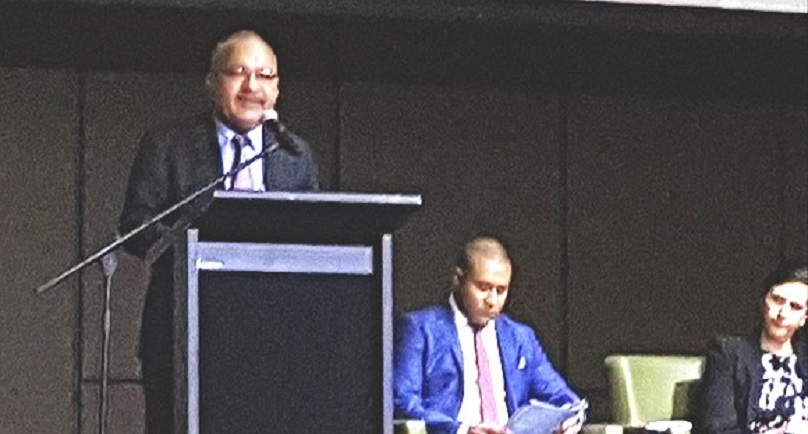The Prime Minister Peter O’Neill has outlined a plan for greater government involvement in Papua New Guinea’s industrial development. In a speech to the Australia Papua New Guinea Business Forum & Trade Expo in Port Moresby this week, O’Neill outlined how to broaden the industry base and move some industries up the value chain.
O’Neill told the forum that both PNG and Australia have experienced economic stresses because of adverse movements in commodity prices.
‘There is no doubt that the past few years have been challenging for both economies as we weather this,’ he said.
O’Neill claimed the PNG economy had performed well despite the downturn in commodity prices.
‘While many commodity-exporting countries have faced similar economic decline, PNG has been able to maintain positive growth. With the global economic downturn, we had to make some tough decisions.
‘Our economy is growing in a positive direction, inflation is manageable and our debt levels remain sustainable—it is well within the limits of 35 per cent of GDP. ‘
‘The economic downturn contained some important lessons for the country.’
In a positive signal to the resources industry, O’Neill added that the government will ‘deliver’ Total’s Papua LNG project, and the proposed Wafi-Golpu and Frieda River mines.
Value chain
O’Neill said that the economic downturn contained some important lessons for the country. He outlined initiatives designed to move PNG up the value chain in select industries. One of those is fishing.

Fish processing is a growing industry in PNG, especially along the country’s northern coast.
‘Our plan is to ensure that all the fish caught in Papua New Guinea is processed in Papua New Guinea. Or, at the very least, will be processed onshore.
‘I have instructed the National Fisheries Authority to cease the current practice of discounting the sale price of vessel leases.’ O’Neill claimed this could create 16,000 new jobs in regional centres.
Another industry O’Neill believes should be targeted is logging. ‘By 2020, there will be no more round log exports,’ he said. ‘We will work closely with companies already located in Papua New Guinea.’
O’Neill added that there is an opportunity to add value in the petrochemical industry.
Broadening the base
O’Neill said there is also a need to broaden PNG’s economic base: ‘moving away from this boom and bust cycle’.
‘We must manage our economy so it can continue to resist such cycles. We can’t continue to rely heavily on the resources sector forever.’
O’Neill pointed to agriculture as a potential growth sector. ‘We have great potential with millions and millions of acres of fertile land. But we have never been able to utilise that well. Instead, we import food instead of growing it ourselves.’
‘The main target market is Chinese tourists.’
O’Neill nominated rice, coffee and copra as export commodities with potential to grow. He said the challenge is to improve the supply chain by building infrastructure so the commodities ‘can make it to the markets, not only in Papua New Guinea alone.’
Tourism

Tourism has great potential in PNG.
Another sector offering potential is tourism, according to O’Neill. ‘We are one of the most diverse and spectacular countries on Planet Earth.’
He said the strategy is to work with the regional governments to create tourism hubs to ‘enable large scale tourism’, and also establish more air links.
The main target market is Chinese tourists. ‘There are more than 100 million Chinese people who visit countries all throughout the world. All we want is a small fraction of that market.’


